Meet Tiger and Liu
Leona Lewis?
We were at the posh courtyard of Beijing's Legation Quarter, surrounded by fancy restaurants and dozens of Germans scurrying around with their walkie talkies. The Mercedes Luxury Night event was about to begin and there was word that some famous artist would be there to perform. We were all excited when the lights dimmed.
"So who is the artist performing tonight?"
"Leona Lewis."
"Leona who? Is she famous?"
"Not sure. I've been in China too long. I think she won some awards."
"Like an idol or something?"
"Heard she sang the Avatar theme song."
So that was the extent of our knowledge about Leona Lewis. But it was an entertaining evening indeed.
2010 Beijing Auto Show
I was working for BaderTV during the Beijing Auto Show recently and our coverage was for Mercedes' new concept shooting break. The massive exhibition centre in Shunyi had tonnes of vehicles on display, and its not just cars. Heavy duty trucks, family caravans, modern schoolbuses were all part of the show. It's one of those jobs that would make most guys happy--200,ooo sq meters of cars and girls. Of course the quality of the models also depends on the car company that hired them. You can spot the big difference between the Mercedes girls and the girls next to an obscure local brand.
Forbidden Snow
It was already starting to snow the night of 2nd Jan. By morning, a thick layer of snow had already formed on top of cars by the street, just like icing on a cake. Snow was still falling and there was no sign of it slowing down. Traffic was slow and the roads were slippery. But there was no stopping me from having some fun that day.
So off I went to the rear end of the Forbidden City. I figured I wouldn't survive walking through the entire complex from the south entrace to the northern exit, so I decided to get a few shots from the north gate and trudge up the tiny hill in the park overlooking the palace. Dozens of enthusiastic photographers and tourists were already snapping excitedly in the park and outside the palace gates.
Back in the old days, when I first came to Beijing, I would be starting a snowfight with my friends at the first sight of snow. But after some serious observation, I decided to best leave the snow where they are. If you look at the roads, it will look as if there's milk on the sidewalk and coffee on the tarmac. And where milk and coffee meets, umm...it doesn't really sound that inviting. One of my friends once screamed at me, "DON'T TOUCH THE SNOW!!! THERE'S SPIT IN IT!!" The urge to make a snowman quickly dissipated and white snow never looked the same again.
Real World Beijing

The Chinawoman
My mother calls me a Chinawoman. And it’s not just her.
“Not too much chili, please. This Chinawoman cannot tahan too spicy!” broadcasts my auntie.
“Like this also you call spicy, ah? Chinawoman lah you,” teases my friend.
To them, people from China have no tolerance for spicy food. To them, a Chinawoman goes to a curry mee stall and ends up ordering clear soup noodles. To them, a Chinawoman eats her popiah with no chili sauce. Therefore, Chinawoman and I… we’re comrades.
Four years ago, I left for Beijing with that impression in mind. Little did I know that the land of Peking duck turns out to have a fiery appetite for this thing called mala huoguo, a boiling cauldron of bright red broth with a layer of dried chilies floating on top. It literally means numb and spicy hotpot and is certainly something that “Chinawoman” should avoid. A sniff of the acrid fumes coming out of the bubbling lava is enough to send any Chinawoman coughing til her eyes water.
So for the first year I was in China, I stayed away from any of the mala stuff. However, all these spicy hotpot restaurants are as ubiquitous as kopitiams are back home, and they are always packed. Everyone seems to enjoy eating their sliced lamb and pig’s brain and cuttlefish balls out of the chili broth. And these are local Chinese people, who I thought had the same “Chinawoman genes” like me. So what happened to the Chinese-people-can’t-eat-spicy-food theory?
I began to observe this baffling phenomenon. Most Chinese, it seems, are eating even spicier stuff than Malaysians. Shui zhu yu or “fish cooked in water” is big bowl of oil with slices of fish in it and a sea of dried chili floating on top. La zi ji ding or “spicy diced chicken” consists of tiny pieces of fried chicken buried under a pile of fried chili peppers. Qing jiao niu wa or “bullfrog with green chili” is a huge bowl with bullfrog meat submerged in oil with green chilies and fresh green peppercorn. Sounds harmless but it’s enough to send the spice-o-meter up the roof.
As I quietly cook my meat on the clear soup side of the hotpot, my Chinese friends would tackle the fiery red broth on the other side. And as we eat, the usual comments would crop up.
“And you call yourself Malaysian? I thought you guys eat spicy stuff and curry all the time.”
“You are Malaysian! Come on, how can this be spicy?”
I find myself in an identity crisis. In Malaysia, my zero tolerance for spicy food categorized me as typical Chinawoman. In China, I get dismissed for being such a weakling amongst the chili oil-guzzling, Sichuan cuisine fans.
It’s about time I bust some myths on this issue. First of all, the “China” that our mothers and grandmothers refer to points to the southern provinces of Guangdong or Fujian where most of the Malaysian Chinese population emigrated from. The cuisine from this region has a blander and subtler taste than other parts of China, with chili playing a very small role in Cantonese cooking. Therefore, “Chinamen” and “Chinawomen” have a very low tolerance for chili. And as you move further north, preference for stronger tastes becomes the norm. In provinces such as Sichuan, Hunan and Shaanxi, tell the cook not to add chili in the cooking and you’ll end up eating plain rice.
Spicy food has become such an 'in' thing nowadays that it’s almost like wearing Gucci or LV – whether you are a millionaire tai-tai or a hawker stall auntie, you have to be seen having one. Indian restaurants in Hong Kong, Sichuan eateries in Beijing, and even curry noodle shops in Ipoh are tipping the scales in terms of popularity.
For Malaysians who can’t eat spicy food, you might as well wear a “loser” banner around your necks as you sit next to the cool crowd slurping curry laksa in the coffee shop. I, on the other hand, will be joining my comrades at the hotpot joint. Two dips in clear soup and one dip in mala soup. What can I say, we all need some extra spice in our life.
Eating wawa yu on National Geographic

I received an email from a friend a few days ago. Re: What are you doing eating wa wa yu on National Geographic??
Ah, must be that program last year where we were caught on camera with a Steve Irwin-type croc hunter. Yes, Brady Barr is the new croc hunter on Nat Geo and this time, the crew is in China to find 'wawa yu'. In order to find a salamander or 'wawa yu' and film it on a plate in a restaurant, they had to pack a take-away from one restaurant and bring the dish to another restaurant to film. I was lucky enough to get called over for a free lunch by the local field producers.
For 2 little salamander paws that cost 2000RMB, I was adventurous enough to check out what the fuss is all about. Tastes like pig trotters.
Xinjiang on a Regular Day
This is a visual diary of my trip to Xinjiang.
I saw some local folks making lamb dumplings in the market one day. It was an interesting process indeed. Right at that moment, the man handling the dumplings dropped a few pieces onto the ground. Lucky for him, a comrade who was chopping up firewood on the ground instantly picked them up, gave them a good cleaning by spitting on them, and then handed them back to the dumpling seller. Thanks, comrade! You just saved that guy the trouble of cleaning the dumplings.
Old City of Kashgar
The old city of Kashgar looks like a set out of Alibaba and the 40 thieves. Old living quarters on mud terraces create a labyrinth within this old part of the city. High Terrace Folk Houses are a unique part of Uyghur ethnic history.
A View from Above
Adili and his students practice on a wire 25m above the ground inside this auditorium. It would require a certain level of fitness, not to mention small body size, to climb this ladder to the top of the wall. I managed to climb up with my backpack on, getting stuck a few times as the bag got caught on the sides. Camera equipment and tripod had to be hauled up with a pulley. Praying hard nothing drops on the way up.
Once on the top, Adili was full of ideas as to how we should film him. Already a media savvy celebrity, he suggested tying the DV camera to one end of his balancing pole for a side shot. Great suggestion. I crossed my fingers again and handed the DV cam over.
We had to make our poor guest perform a few times with the DV on one side of his pole because we realized after the first round, that the DV cam wasn't properly focused. Yea, its almost like capturing a great kodak moment and then realizing later that the camera wasn't even turned on. But in this case, it was ok because this veteran tightrope walker could do a few more flips on the high wire, no sweat.
But for me, the climb up and down the neverending ladder was enough to keep me off the stairmaster for a while.
You can watch the feature on Adili Wuxor on the Artsworld program here.
Meeting Man on the Wire


I was in Xinjiang for a week a few months back. So far, the only warning that I got from friends who knew I was there was - be careful of terrorist attacks. And that was just because of a few isolated cases of bombings that happened last year.
I was there to interview Adili Wuxor, celebrity tightrope walker and Guiness World Record Holder. He now has 5 world records under his belt, including walking on the highest altitude, longest distance, and longest amount of time on the tightrope. He has even survived 25 days on the tightrope, only eating and sleeping in a makeshift hut on one end of the rope and performing on the rope during the day.
We spent 3 days in the capital of Urumqi and another 2 days in the old city of Kashgar, following the life of Uyghur acrobat, Adili Wuxor.

This is a picture with Adili among the apricot blossoms in his hometown. Covered in yellow dirt from head to toe, we had a piece of Kashgar to take home with us in the form of sand.
I will blog about Xinjiang now
Since the banning of Youtube, I've had to find a new way to upload my videos. My website still runs but half my content are redirected to Youtube and Blogspot and Flickr. So, with the current situation, most of my stuff are inaccessible inside China.
Since everything is now blocked from within China, I can just blog about anything at all. No need to worry about getting blocked, coz this can't be viewed in China.
So next post, I will be talking about Xinjiang. Yes, Xinjiang, the topic that they so very much want to avoid.
Olympics Day 14: Who is Kobe?
 On most evenings, US athletes and gold medal winners were invited to our studio as guests on the Morning Show program. There have been countless instances where we would stare at each other and ask, “Who is that?” “Is it worth taking a picture with him?”
On most evenings, US athletes and gold medal winners were invited to our studio as guests on the Morning Show program. There have been countless instances where we would stare at each other and ask, “Who is that?” “Is it worth taking a picture with him?”As close as we were to the action, the names and faces of athletes do not stick in our heads. I remember an intern asking me to get her Kobe Bryant’s autograph if I happen to see him at a press conference. But first, we had to print out a photo of Kobe for him to sign on. The real question is: What does Kobe look like? None of us could tell. Is this him or Michael Jordan? I laughed. I guess I can ask any black basketball player to sign it and she can’t tell the difference.
On day 14, I finally got to get up close with an Olympic gold medalist – Stephanie Brown Trafton, gold winner for women’s discus. Unlike high profile athletes like Michael Phelps or Kobe Bryant, it didn’t feel like I was interviewing a celebrity.
She was tall. At 6-foot-4, she towered over me as I tried to hold the mic up for her to speak. As discus ranks pretty low in the America’s games priority, a gold medal discus thrower does not exactly attract a lot of attention on the street. At the end of our interview, we took a picture together for memorabilia. At least I got to take a picture with a gold medalist.
Its probably the same kind of mentality for autograph hunters. As long as I get a signature of someone with a gold medal, its worth something. And it was also at that moment that an autograph hunter showed up. He got Stephanie’s autograph, then turned towards me and asked, “Who is she?”
Olympics Day 11: Circus and Sideshows
Day 11 of the games and the crowd outside the Olympic green remained strong, and varied. There are many reasons to take a walk outside the stadium. For one, you can definitely find dozens of scalpers displaying tickets for sale. Just hang around outside any venue and I am sure you can get yourself some tickets to watch the games. And just for the hell of it, entertain yourself with the sideshows that come along with the Olympics. Like any circus, the Olympic sideshow has its own clowns and freaks.
We met some interesting characters that day -- Bruce Lee, the emperor and his eunuch, and a strange guy that makes you stare at him while you count the number of reasons to justify your urge to laugh. All these people have come from different parts of China and they are here to display their artwork and handmade souvenirs in support of the Beijing Olympics.
 The outer perimeters of the stadium is also a good place to source for innovative entrepreneurs and performers. These guys in the picture are advertising their own hands-free binoculars. Interested? You can buy one off them and watch the games from the furthest seat in the stadium. Hands-free.
The outer perimeters of the stadium is also a good place to source for innovative entrepreneurs and performers. These guys in the picture are advertising their own hands-free binoculars. Interested? You can buy one off them and watch the games from the furthest seat in the stadium. Hands-free.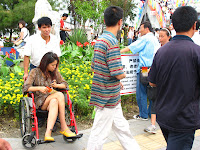 But then again, not everyone gets their promotional strategies correct. This 'handicapped' lady obviously didn't pay much attention in her Acting 101 class. With her legs crossed and sitting on a wheelchair, can we not tell what is wrong...or right...with her? If you can cross your legs, lady, you can definitely do the moonwalk. Sympathy points out the window.
But then again, not everyone gets their promotional strategies correct. This 'handicapped' lady obviously didn't pay much attention in her Acting 101 class. With her legs crossed and sitting on a wheelchair, can we not tell what is wrong...or right...with her? If you can cross your legs, lady, you can definitely do the moonwalk. Sympathy points out the window.And irony no.2, she was waving her 2 tickets while sitting cross-legged on a wheelchair, next to a sign that says: Scalping of Olympic tickets is prohibited, and any breach should be punished accordingly to relevant laws and regulations.
Olympics Day 6: One Dream, One Shopping Paradise
Watch CBS Videos Online
LV, Gucci, Prada…here we come.
It’s shopping spree day for our team today. Equipped with our little Flip camera, we set out to join the thousands of athletes and Olympic tourists at one of Beijing’s hottest destinations – the Silk Market.
The slogan for this Olympics season: “One Dream, One Shopping Paradise.” I definitely agree. Looking at the trolleys and bulging suitcases that smiling athletes are dragging out the front door, there is no doubt that this is a shopping paradise.
After winding through the rows and rows of ‘branded’ shoes, bags and clothings, we commenced to the stairwell for bargaining and further browsing via product catalogs. As a first-time visitor to the Silk Market, it took our correspondent a few tries before learning the tricks to bargaining. “Hey these people are quite fun! ”
Cursed, pandered and physically dragged into shops by feisty salesgirls, the dream suddenly turned into a never-ending nightmare. Manny spent half an hour haggling with the girl at the jeans shop, who started off by calling him Handsome and slowly progressed into Mr Stingy as prices dipped. I couldn’t stop laughing as I documented the whole process with our little Flip camera.
Before leaving, we decided to get a few shots with the big camera. The whole complex was filled with media people. So we followed them to the main reception to see what other news crews were filming. There, we were greeted by the Media Desk and were each presented with a little souvenir. We were even offered a media tour for filming in the market. Now that’s real hospitality. Can we get a shot of that ‘Prada’ bag, please?
Olympics Day 4
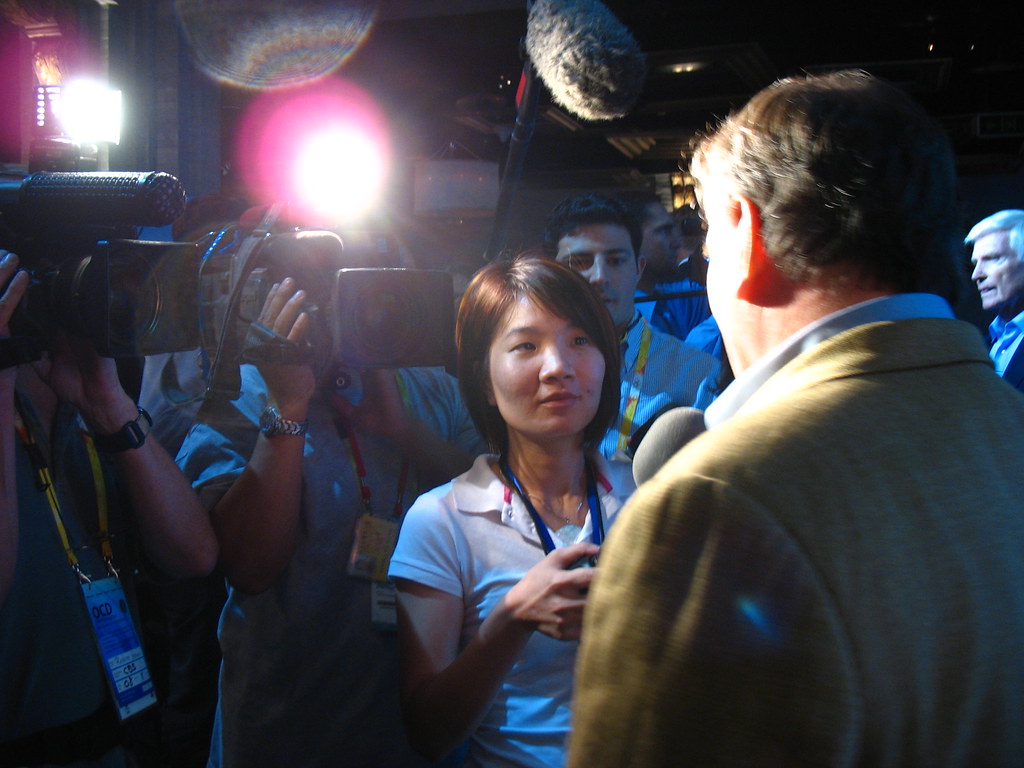 10pm – Chicago 2016 Presentation
10pm – Chicago 2016 PresentationWe were invited to a presentation function at the USA House that evening – free drinks, canapés and a little SWAG (Stuff We All Get) bag. Our correspondent had to write his piece at the office so I was ushered to get a few quotes from the Mayor of Chicago. Our mission that night—get in, grab a drink, grab a few quotes, get out. Of course, I also grabbed myself some Team USA Kleenex tissues and a Team USA water bottle for my overtime.
There are 4 candidate cities contesting to host the 2016 Olympics and Chicago is one of them, running alongside Rio, Tokyo and Madrid. Each country has a House booked out during the entire Games season and the USA House took over Jasmine, a fancy restaurant inside the Workers Stadium. The Chicago 2016 reception was an opportunity to promote the 2016 bid to the media and push Chicago as the next Olympics destination. We were going to visit each of the country houses within the next week and everyone at the office seemed to be anticipating the big party at Brazil House. What can be more fun than being in a Rio carnival with Brazilian dancers and flowing alcohol?
Olympics Day 4
 Bank of America called a press conference for 4x100 Men’s relay swimmer Cullen Jones after the team’s Gold medal victory at the miraculous Water Cube, where 25 world records were broken. For press conferences like this, we decided to arrive earlier to secure a spot for the camera and avoid any unnecessary elbow fights for our cameraman.
Bank of America called a press conference for 4x100 Men’s relay swimmer Cullen Jones after the team’s Gold medal victory at the miraculous Water Cube, where 25 world records were broken. For press conferences like this, we decided to arrive earlier to secure a spot for the camera and avoid any unnecessary elbow fights for our cameraman.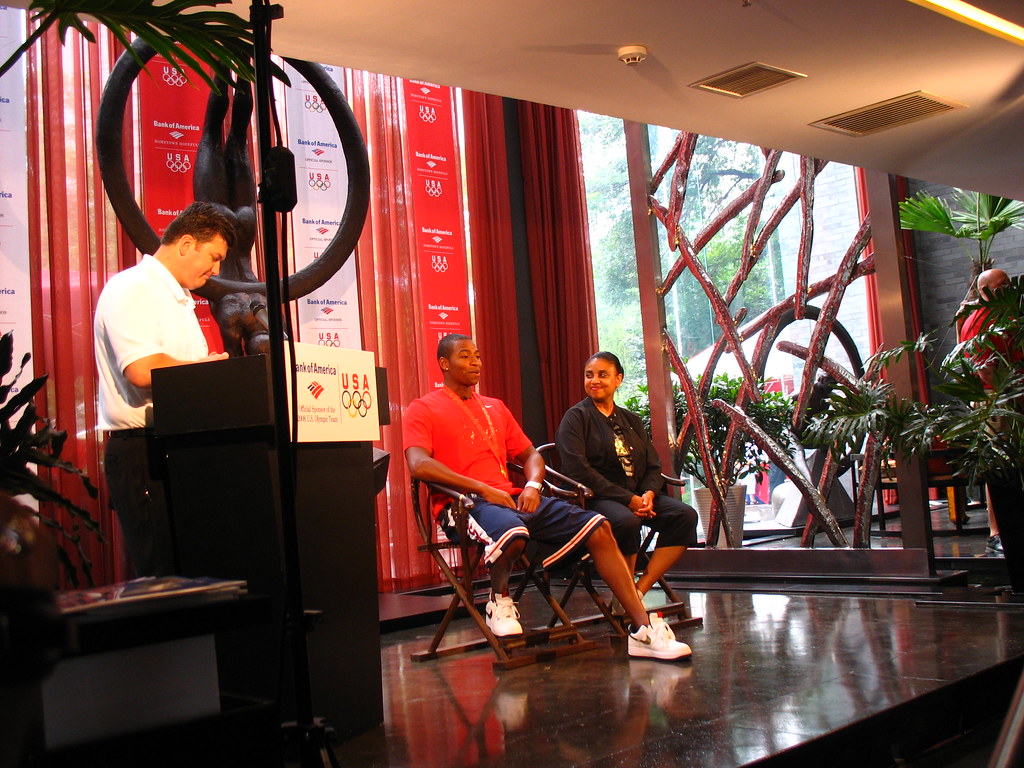
Jones is the first African American to hold a world record in swimming. As records were smashed one after another at the Aquatic Centre this summer, media attention turned towards the many factors that made this Olympics a breakthrough for swimming.
First, there is the theory that the design of the water cube plays a role in increasing performance in the pool, making it the fastest pool in the world. It is 3 meters deep, a meter deeper than that of Athens, which allows swimmers to go faster with less drag.
Then, there is the Speedo LZR Racer suit, which was worn by all, except 2, of the record-breaking swimmers. Designed with NASA, the LZR Racer is said to be able to cut swimming time by up to 2%.
As Jones talked about his training days and dedication to swimming as a sport, he was quick to dismiss any thoughts about the suit being the main reason for his success. “What I can tell you is that, THE SUIT did not wake up at 5am in the morning for training. I did,” he reminded the crowd.
And he’s probably not the one to talk to for Speedo credits. After all, he wasn’t sponsored by the swimwear maker. Endorsements don’t go cheap at this Olympics.
Olympics Day 2: Murder in Beijing
 Click on picture to view video
Click on picture to view videoBeijing Olympics
Day 2
Probably the most exciting day for all news crews in Beijing.
Only one day into the Olympics, and 2 family members of the US team volleyball coach have been violently attacked at a tourist attraction in downtown Beijing. A man and woman have been stabbed by a Chinese man while sightseeing at the Drum Tower. Their attacker then took his own life by jumping off the second storey of the ancient building. One of the victims died while the other was severely injured.
We headed out to the Drum Tower after news hit the wires. Conspiracy theories and speculations shrouded the whole incident as information flowed in about the victims' connection with the US team's volleyball coach.
By the time we arrived, the whole area was surrounded by journalists. Live satellite equipment were sprawled out in front of the tower, correspondents from Hong Kong and Japanese stations were going live, camera crew got out of their trucks one after another, reporters were already grilling the shopkeepers nearby as cameramen stick their cameras between the iron grills of the Drum Tower gate. The entire vicinity was crawling with journalists. It was a circus.
And also a war between those of us with a mic and a camera. Overhearing a witness in his conversation with another journalist, I stopped on my tracks. I looked at Manny, our correspondent. We've got something here. Immediately, he took his mic out and stepped in. Our cameraman followed suit.
The Spanish journalist who was talking to the guy got feisty. "Hey, I talked to him first! He's my interviewee!" Manny assured him, "I'm only taking a second. Just one question." Relax. His cameraman wasn't even there to film his interview. We were already rolling and by that time, the others could already smell the blood. Dozens of cameras pounced on us as the guy began to talk. Within a few seconds, I was pushed out of the circle by the paparazzi crowd. Enjoy your one minute of fame, my friend.
After hanging around for more than an hour, we decided it's about time to go home. As Manny finished his stand-up in front of the camera, a policeman appeared with a black bag in hand. "Ask him something. Go. Ask anything," Manny told me. With a smile on my face, I followed the guy.
"Excuse me. Do you know what happened over here?" I asked in Chinese, a big grin on my face. I could tell there was a little smirk on his face as he stared at me for a split second before blatantly slamming the car door on my face. Manny and Bob burst out in laughter. Okay. At least I tried.
Watching the Nest for 25 Days
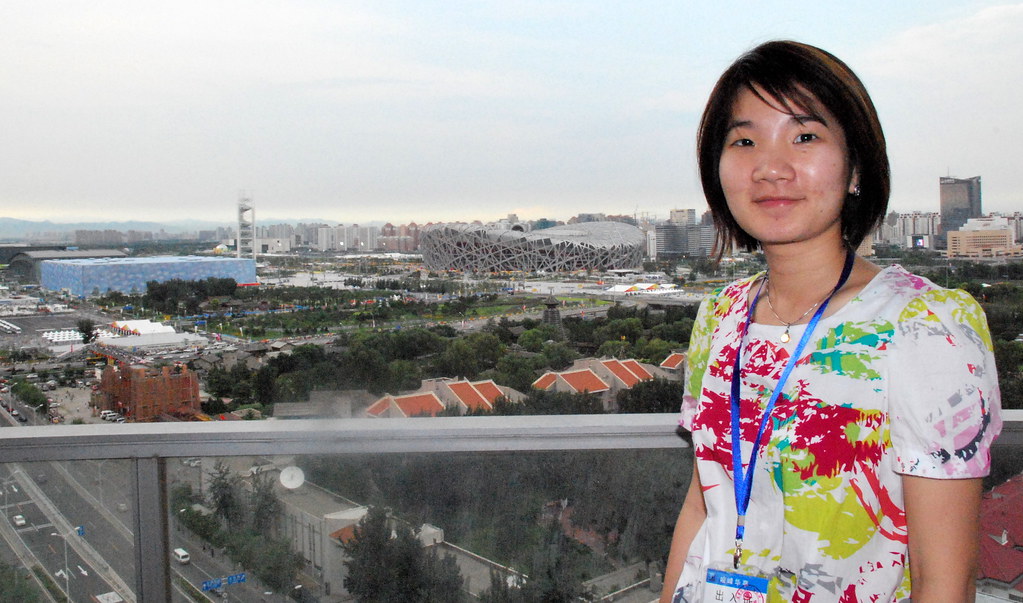
Just a stone's throw from the main Olympic stadium, the CBS workspace balcony offers a good backdrop for photos.
We order our box meals from the seafood restaurant across the street and the US crew lives in the apartments next door.
In addition to the entertainment and relaxation options around the area, there's a little massage parlour that puts creativity on the top of their list. With massages called "Give it to me one more time" and "Happy Landing", those who have been there can't help but return with a grin as they ask for their usual, "Give it to me one more time!"
8-8-08 The Magic Moment
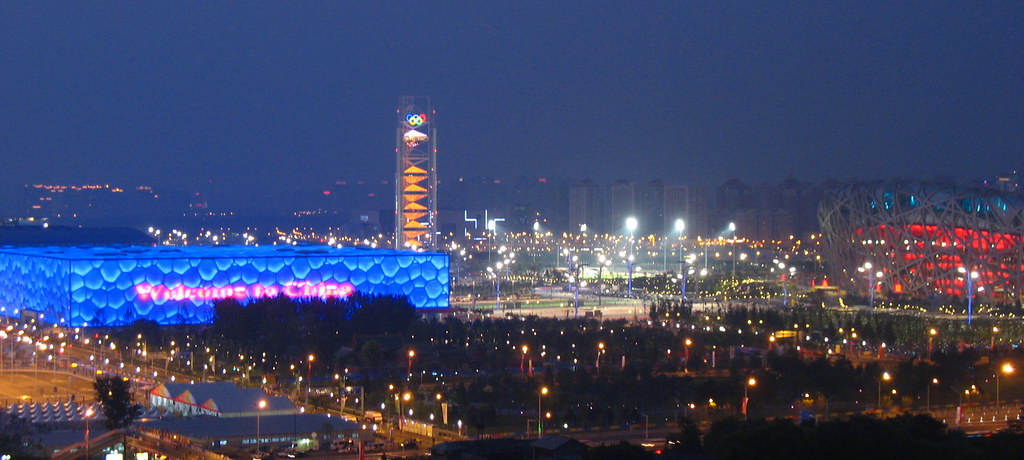
Click on picture to view Opening Ceremony fireworks
The much awaited moment has finally arrived. 8-8-08.
Beijing is in its best behaviour. The streets are clean. Traffic is clear. It seems like everyone is holding their breath in order to maintain the current perfection. But one problem remains. It's only a few hours to the opening ceremony and I can't even see the countdown clock. A thick blanket of fog clings on to the city.
For the entire month of August, I will be watching the Bird's Nest and the Water Cube from our 20th floor workspace overlooking the Olympic Green. A week has passed. 16 more days to go. The excitement of working in such a strategic location has slowly waned off.
4 hours and counting to the auspicious hour of 8:08 pm. Helicopters hovered around the stadium vicintiy. All roads around the stadium have been sealed off but the subway will be running 24 hours that day. We were not allowed to leave the office building until the opening ceremony is over. The police have come up to warn us not to go out onto the balcony. Tell your reporters that there will be no live broadcasts from the balcony during this time. Do not open your windows. Anyone sticking their head out of a building that overlooks the stadium is a security threat. Who knows, one of you might be an al-qaeda sniper trying to assassinate Bush.
As fireworks filled the sky that evening, we hurried back and forth between the tv screen and the glass window facing the Bird's Nest. We witnessed history that night. The 2008 Olympics has officially begun. On my way home that night, I have never seen the streets of Beijing so deserted. Our driver laughed as we zoomed along the deserted streets, "The only time that Beijing has ever looked like this was during SARS."
Lessons to Learn About Rain Outside Spain
However, a lesson I learned from a recent commercial shoot is that making rain is not so easy after all – especially in Beijing...

Click on picture to watch the video
Lesson 1: Nothing is Impossible
As part of a promotional video to demonstrate rain recycling technology at Beijing's National Stadium, my production crew was given the task in locating a watering can for the ‘raining’ scene. Piece of cake, I thought. “Just go get a watering can from Carrefour or Wal Mart,” I told my colleagues. “You know, those with a shower head in front,” I explained in detail.
After driving around for 2 hours and looking at various department stores and gardening shops, my Beijing colleague called me on my mobile phone. “Why do you need those watering cans? Nobody in Beijing uses those anymore. It's either a hose or those little spraying cans. You can't find those anywhere in Beijing!” he complained in Chinese.
I heard a bit of commotion on the other end of the line. “Hang on, speak to Mario,” he said. Mario was the Spanish producer who flew in for the project. He had this distinctive Spanish accent which I found pretty funny, especially when he said this (note the accent):
“Soooki…what is dis? Don tell me you c’nnot get a fucking watering can een China! They fucking make eet for the world! All our watering cans are Made In China and you c’nnot find eet een Beijing? This ees impossible…”
Well, I find it pretty impossible too. I know the watering cans in Malaysia are probably made in China. But what can I say? The Beijingers say they don’t have it here. And I do believe that there are many things that should be available everywhere else cannot be found in Beijing (such as toasters, blue tacks, dehydrated vegetable).
And mini pagodas.
Lesson 2: Everything is Possible
We were told to find, steal or grab a miniature pagoda for a last minute shoot. Ummm…we could probably get one in Wangfujing or the Silk Market downtown where there are hordes of tourists but we were in the middle of the university district and nobody there needs a mini pagoda. “You can even get it at a gas station in the US. Why can’t you get it here?” asked our US producer Erica. Again, I would say: “Everything is possible in China.” And which Chinese person would want to buy a mini pagoda?
Lesson 3: With Money, Impossible is Nothing!
Our final task on the last production day was to find a bird’s nest. Again, steal one, buy one, make one. Just get one.
Luckily for us, the artistic director pointed out a guy who was weaving crickets and grasshoppers out of grass shreds inside a little hutong. So we enquired if he could help us whip up a bird’s nest in a twinkie. Thinking that we wanted him to construct the Olympic stadium out of grass, the guy hesitated. “I’ve never done it before. Even if I could, it will take a few hours to make one,” he said.
Mario eyed the guy, turned towards me and said, “Tell him I give him 100 yuan. Make one in 5 minutes.”
The guy was still not confident about his nest-weaving skills.
“Tell him we’ll buy all his grass. We will make eet ourselves. How much for the grass? 50 yuan? No problemo,” Mario continued.
In short, we paid 100 yuan for a bunch of grass. The guy weaved the basic structure and Mario finished up the rest of it. So we got ourselves a neat little bird’s nest which did get a lot of attention from the local people. Who says money can’t buy love?
Earthquake Tremors Felt in Beijing
"Can you feel that? It's swaying," he said. For a second there, I felt dizzy. The building WAS swaying.
My mind went blank. Earthquake? I wouldn't have thought of that coming. But if Steve said so, he's probably right. With Iraq and Indonesia on his CV, he probably has an instinct better than mine.
I shot up from my desk, grabbed my phone and bag and headed out the door. I could see the girls from the cosmetic surgery place next door rushing back into their clinic. Steve and I stomped down the stairs with a million other people rushing down from the floors above us. A cleaning lady stared at us with curiosity as she calmly mopped that patch of cement in front of her. Ayi, it's an earthquake. You can stop with the mopping.
I wasn't sure if it was the stamping from the hordes of people above me, but I thought I felt some vibration in the stairwell as we were heading downwards. We exited the building and walked towards the edge of the compound, away from the tall buildings. Many people were still idling in the courtyard between the complexes. "If these buildings were to collapse, that's not a good spot to be in," pointed Steve. I quickened my pace.
We stood by the side of the road as throngs of office workers joined us out in the open. Some people were still inside their offices. I could see people peering out of their windows on the 2nd and 3rd floors.
It was 2.57 pm. I tried to make a few phone calls but the lines were congested. Everyone was on their phones. Only SMSes could get through on my phone.
We stayed outside for about half an hour before returning into the buildings. On the way back, the building management distributed some notices on earthquake prevention measures.
Great. Just when we need it.
Gibson guitar photo gig
For Beijing Residents, Home Is Where the Family Is
 Published 2 Feb 2008 for CNN.com. Click here for link.
Published 2 Feb 2008 for CNN.com. Click here for link. BEIJING, China (CNN) -- Peter Wu is brimming with pride. "Have I told you that I'm a father now?" asks the 35-year-old Beijing resident. "My wife just gave birth to a baby girl!"
The baby is a timely addition to Peter's family, not least because they are faced with the pending demolition of their home, which is located along the narrow alleyways of one of Beijing's ancient hutongs. Peter says the compensation he was set to receive from property developers for his 20-square-meter house would have been about $1,170 per square meter.
But a new member in the family changes the equation.
"Now that my baby's arrived, they'd have to compensate me enough to buy a three-bedroom apartment," says Peter, who went by a false name for this interview.
Peter is among thousands of families in the path of China's rapid redevelopment. Under the country's compensation system for claiming their property, officials consider not only the size of the house, but also the size of the household, according to an expert.
"There are many factors governing the compensation payment offered to private owners in the case of an expropriation," explains Wang Yi, Professor of Law at Renmin University of China. "But in both cases, the number of people living in the household is indeed an important factor when considering compensation payment."
As China grows and prepares for the 2008 Olympics, older neighborhoods are making way for new sports facilities, luxury shopping complexes and residential areas. Between 40,000 to 50,000 households a year have been relocated during the past few years as part of the Chinese capital's redevelopment program, according to Sui Zhenjiang, director of Beijing's construction committee. However, a report by the Geneva-based Centre on Housing Rights and Evictions puts that number at 1.5 million.
Real estate prices have skyrocketed. The cost of new homes increased 42 percent -- from $821 per square meter to $1,169 -- between 2004 and 2006, according to a report published by Web site Sina.com and New Real Estate Magazine. As the capital's real estate prices climb, more residents are refusing to move due to what they see as low levels of compensation being offered to them. There have been protests in cities-- and rural areas -- across the country with accusations of illegal land grabs and unfair compensation.
"I'm not moving," says the owner of a small convenience store inside the narrow alleys of Dacaochang Hutong, right behind Wangfujing Grand Hotel. "With the amount of money they are offering, you can perhaps get something outside the fifth ring road. [But] there is no way I can buy my own place anywhere within the city."
Rewards for resettlement
Peter now waits to see if the arrival of his baby girl will boost his chance of higher compensation. "It is commonly known that even with the same property size, a household with five members is definitely entitled to a larger compensation than a household with just two members," Peter says.
"With five people in the family, the compensation would have to be enough to buy a two- or three-bedroom property. A family with just two people only needs a one-bedroom apartment. You can't pay the same amount of compensation to all families."
For others, it is more than a matter of compensation. There is also the question of history. In Beijing's narrow alleys -- or hutongs -- where Peter's home is located, residents look upon their neighborhoods with pride, an aesthetic dating as far back as the 13th century. They say the hutongs helped shape the capital's character and now ask: "at what price new development?"
With skyscrapers rising around them, residents of these old Beijing quarters still go about their daily routines as demolition looms: old men chat over a game of chess in the middle of the alley; second-hand traders haggle over the price of old electrical goods; and pet owners take their dogs out for a walk.
The only thing that is visibly out of place in this pleasant neighborhood is the eviction posters plastered on gray brick walls at every turn. The meaning behind the posters is loud and clear: "7 Days." That's the countdown to the deadline for early relocation rewards. Those who choose to move out before the deadline will be entitled to a $7,314 reward. The award matters little to Peter; he says he would not accept the money.
"The amount is too low. It would have to be at least $6,648 per square meter. Or else, we're not budging. We're sitting on prime land!"Ningxia Part 1: Dirt Poor, Technology Rich

Trip 1:
Early Oct 2007
The
Ningxia is also the home of


We were here to rediscover the life of Ma Yan—the 18-year-old author of The Diary of Ma Yan—who brought us back into her old village in the remote and mountainous areas of Ningxia. The

The landscape was remarkable. I could see vast expanse of parched land along the way, earth that has cracked under the scorching sun and dry winds. “It may look dry, but the recent rain has made it soft. If you step on it, you are going to get sucked in and there’s no way of getting out. Kids have died because of that,” warned our driver.

It didn’t take us too long to discover that the children here are no strangers to the media. In fact, they seem to be a media-savvy bunch. Especially the kids from the village at the bottom of the mountain. They were following us as we walked up. And everytime I touch my camera, the kids around me would suddenly merge into a formation in front of me. I don’t even have to tell them to pose. All I have to do is take my camera out and there’s a pose right in front of me. Great! “1, 2, 3…say qiezi!” (the Chinese equivalent of ‘cheese!’ or rather ‘tomato!’)
It’s always interesting to have cute little village kids surrounding us but these kids here were a wee bit dirty for me to want to hang out with them. All I could remember was, most of them had snot on their faces and were trying to sniff them up and down. There were green stuff trickling down their noses and some had a translucent, glue-like smear across their cheeks. I’d like to play, kids, but we should get some tissues first.

We reached Zhangjiashu at noon and were served lunch at one of Ma Yan’s relative’s house. Almost everyone in the village has the surname Ma, which meant everyone here is related. The houses were made of mud and every family lives in a tiny room which is used as a kitchen, a living room, a bedroom and dining room. They cook there, they eat there and the entire family sleeps there.

Cave dwellings or yaodong still exist for some poorer families. “I used to live in a cave dwelling when I first got married,” said Ma Yan’s mother, Bai Juhua. “Very few people live in one of those anymore. Recently, a few of them collapsed because of the rain. Thank goodness nobody was hurt.”
The conditions in the village were poor. Due to its altitude high up in the mountains, it is impossible to dig wells that are deep enough to reach the water table below. Villagers have concrete wells that are used to store rainwater only when it rains. So what happens when there’s no rain? “We have to walk into town to get the water from the well there or buy water from the village below,” said Bai Juhua. My eyes went wide. It’s hard to imagine living in a place where water is such a commodity that unless someone takes a 2-hour walk down the mountain to carry a bucket up, there is nothing to drink. And don’t even start asking questions about showers.
Shower might be a luxury in villages in
More pictures on my flickr photo journal
The Story of Ma Yan has been aired on Al Jazeera English channel and can be viewed here
Ningxia Part 2: Village Comfort

Trip 2:
Mid November 2007
Unlike my first trip to Zhangjiashu, the scenery this time round was completely different. No rain. No muddy slopes. No more greenery. Everything was brown. Dirt brown.
When I said there was no greenery in sight, I meant none at all. Not even green vegetables. For a dry village high up in the mountains, it is not possible for villagers to grow their own greens. Therefore, the only vegetables that they use here are root vegetables such as radishes and potatoes.
We visited the


Handmade noodles are basic staples here. Freshly made in the little room that is at once their bedroom, kitchen and living room, we sat on the warm kang bed and watched as food was prepared in front us and served to us right there on the bed. That’s right, if you live here, this tiny room is all you get. Eat, sleep, cook, entertain your guests all in one multi-function room.

That night, after 3 dinners and some in-village entertainment over dancing and karaoke, we finally went to sleep inside one of the houses. Nothing was lacking in this village. My stomach was so full after 3 dinners that I couldn’t immediately sleep. The kang bed was in fact too warm that I had to take the blanket off every 5 minutes. The stove, which was next to the bed, was kept burning to keep the room heated so I could smell the charcoal burning throughout my sleep. And thank god I didn’t have to pee that night.
Now that’s another story. There are no toilets or bathrooms here. Or should I say, everywhere can be a toilet. When I asked one of the ladies to bring me to the toilet that evening, she brought me out to the open field next to the house and said, “Here. I’ll stand behind you to keep watch.” I looked out to the vast open land in front of me and the house behind, frantically trying to see if there’s a ditch or an elevated slope there. I was walking in circles.
“Stop walking any further. Do it here,” she said, wondering what the heck I was looking for. So there I was, in the middle of the open field under freezing conditions, answering nature’s call with the lady behind me.
Planet In Peril
Bai Juhua- - the Mother behind Ma Yan

I’ve never heard of Ma Yan before filming this story. Excerpts of her diary published in the French newspaper, Liberation, got the French public talking. A little village girl in China who had no money to go to school—exotic location, mysterious Chinese village, touching story about a girl’s struggle to go to school—I can see why this was a story. However, as we got to know Ma Yan and her mother Bai Juhua, we discovered that the story was more about a mother’s struggle and sacrifice rather than just a girl who wrote a diary.

Bai Juhua, like many other villagers in the area, had to search for work in the neighbouring
Bai Juhua and her fellow villagers had to climb onto moving trains to get to
“Initially, my reason for sending Ma Yan to school was because I didn’t want her to be like me. I only went to primary 1. I didn’t get to study anymore after that. So I told myself, no matter what happens, I am going to send my daughter to school,” Bai told me. Many girls in the village at that time were considered lucky to be able to go to school. Most would be married by the age of 15 or 16.
When Bai Juhua asked if I was married, I couldn’t help but let out a surprised laugh. I was 26 but I never thought I could be way over the hill compared to the village girls who got married at 16. When chatting with one of the village mothers with 3 kids, I discovered that she was only 25.

Many of the women in the villages did not get a chance to go to school. Right now, Bai Juhua devotes most of her time helping Enfants Du Ningxia, a French NGO set up by the journalist who discovered Ma Yan, providing scholarships and better education opportunities for poor children in rural areas. A portion of the royalties from Ma Yan’s publications goes into a trust for helping these children. Bai Juhua is also currently trying to set up a program to empower the rural women of Ningxia through a cooperative embroidery project.
Far Away from the Maddening Crowd

The villagers in the rural areas of Ningxia are Hui Muslims. As a minority group, couples are not restricted by the one-child policy. These kids here have 6 other siblings, making it 9 children in total for this family in Zhangjiashu.
From what we have seen, the whole family practically sleeps together on one bed in a small little room. How couples manage to procreate under such cozy conditions remains a mystery. It must have been a merry occasion by the time the 9th child was conceived.
Guilin

Guilin really did make me feel almost at home--in Ipoh. I've always heard of my hometown being described as Little Guilin, so visiting the real Guilin felt almost like a validating experience. It is indeed pretty similar to Ipoh, just 3 or 4 times better. Sharp, jagged karsts in the backdrop, streams running through lush greenery, vast expanse of mountainous landscape--Guilin was pretty as a picture.
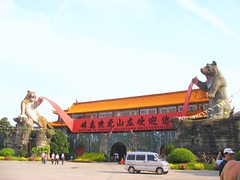 However, my trip to Guilin was a measly one-day trip. And instead of soaking up the natural tranquility of its scenic rivers and mountains, we spent our day at the tacky Bear and Tiger Park (you can tell from the photo at the entrance). Our mission that day was to find some tiger meat and tiger wine, apparently sold at the park's restaurant.
However, my trip to Guilin was a measly one-day trip. And instead of soaking up the natural tranquility of its scenic rivers and mountains, we spent our day at the tacky Bear and Tiger Park (you can tell from the photo at the entrance). Our mission that day was to find some tiger meat and tiger wine, apparently sold at the park's restaurant.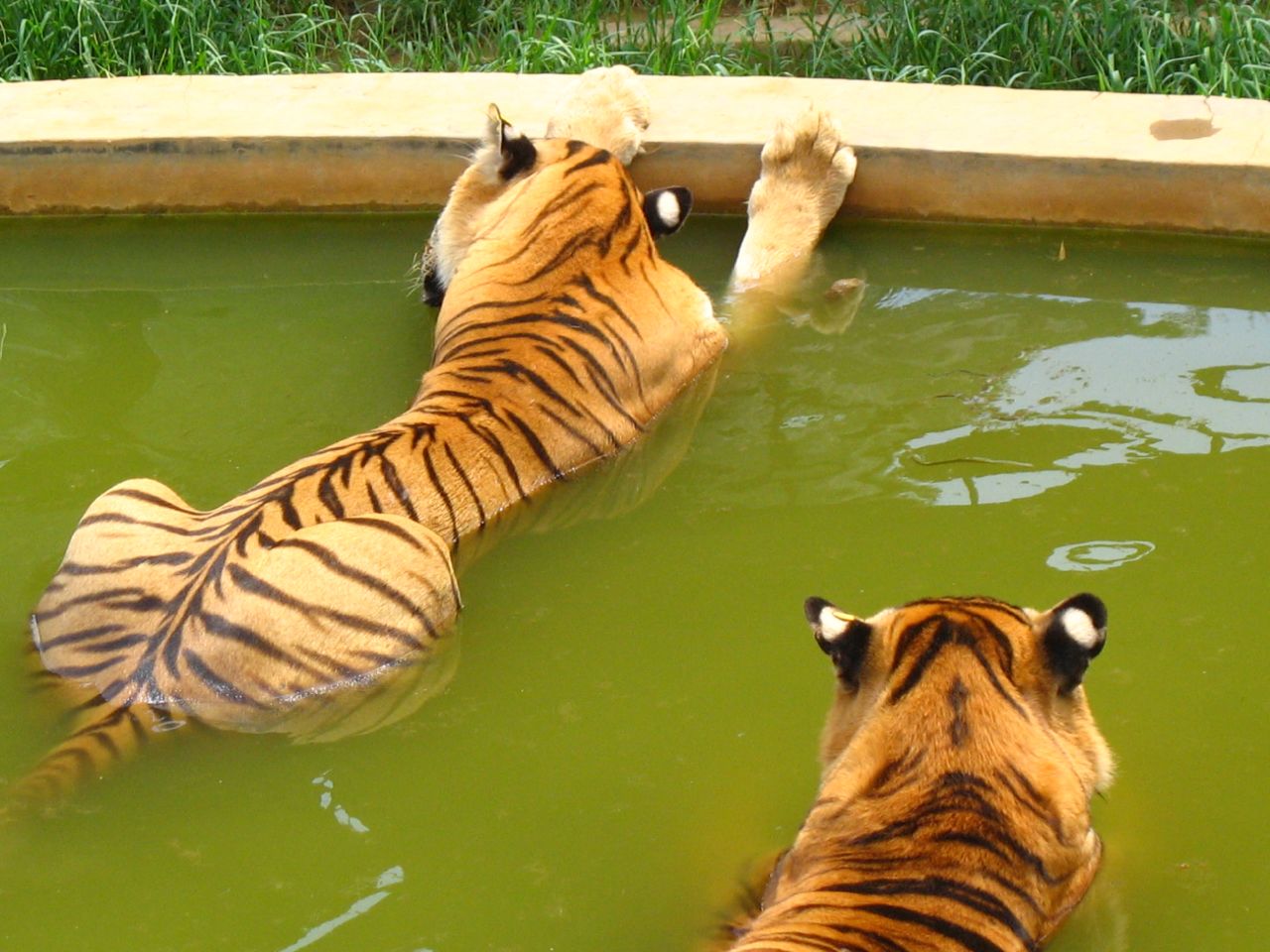
After an expose published by South China Morning Post, the farming and consumption of tiger meat and the use of tiger bones for medicinal products in China have attracted international media attention. And it is probably because of this attention that the restaurant at the park was already closed down by the time we got there. Ok, so no tiger feast. But there's a lot more action in store for us.
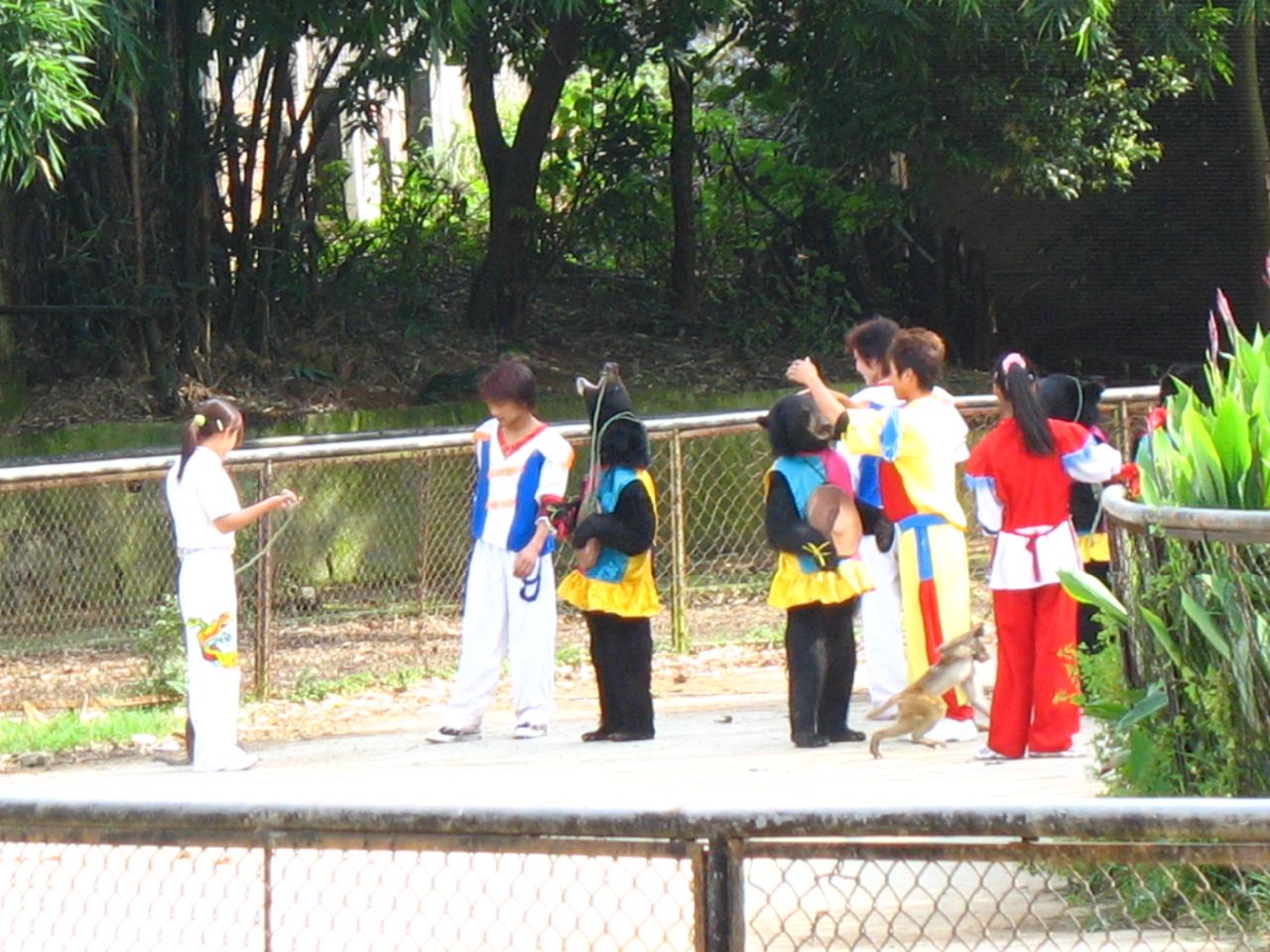
We decided to stay for more entertainment with the bear and tiger performance. Bears were dressed up like dolls, made to walk upright alongside children, and ride a motorcycle on a tightrope. Tigers get to on a parade, jump through hoops, get fed by children and wave to the crowd. A real circus.
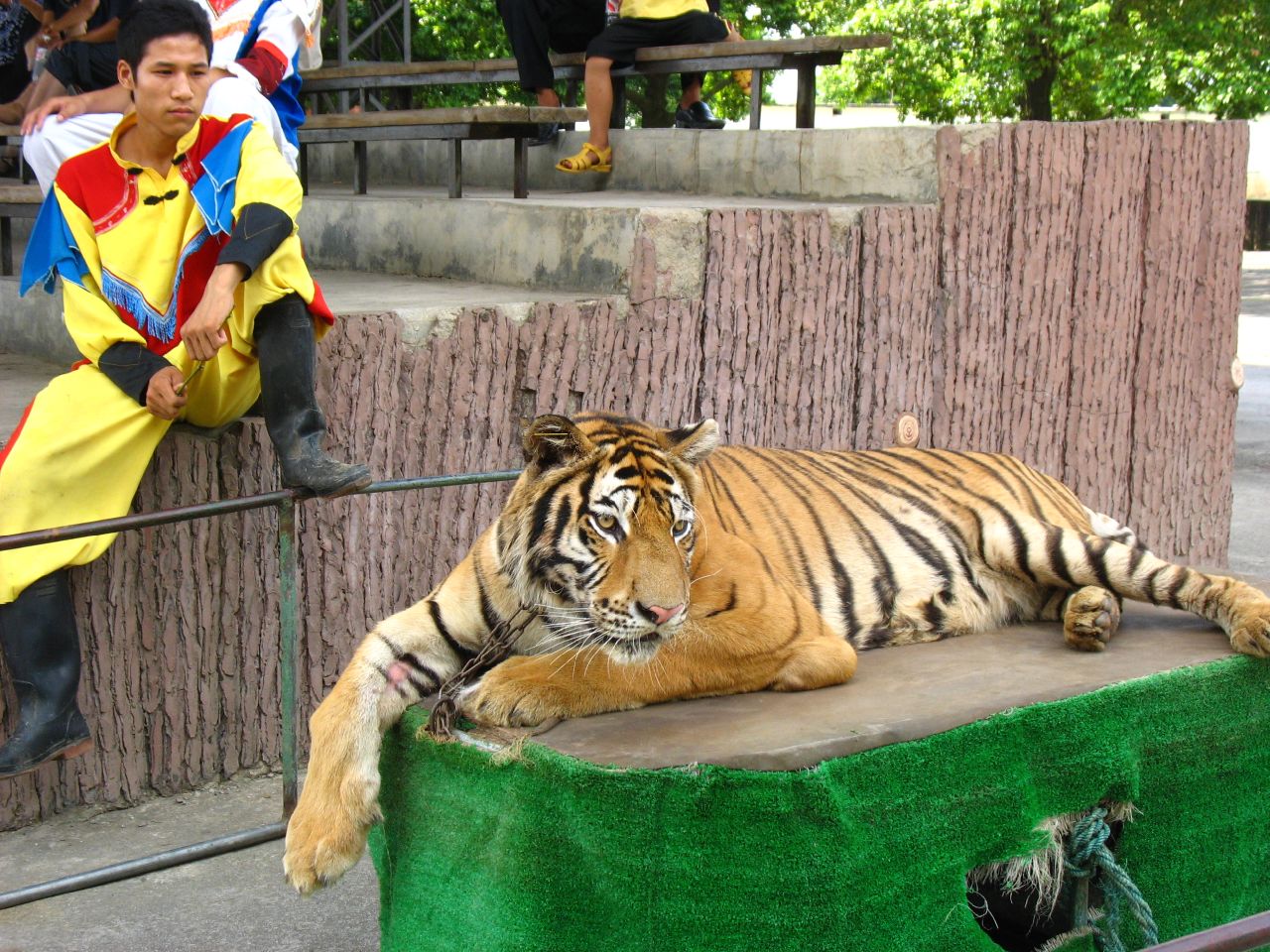 A tiger on display was looking lethargic lying on a tiny platform. Upon yawning, the large cat was given a smack on the face by his trainer. "Pak! Pak! Pak!" I flinched, anticipating the beast to retaliate by biting they guy's face off. But it kept quiet instead.
A tiger on display was looking lethargic lying on a tiny platform. Upon yawning, the large cat was given a smack on the face by his trainer. "Pak! Pak! Pak!" I flinched, anticipating the beast to retaliate by biting they guy's face off. But it kept quiet instead.Hmm, no action there. So we decided to stay for the live feeding. After watching tigers pounce on their prey at the Harbin tiger park, this wildlife training activity no longer seem so shocking anymore. Just that this time, it is one-on-one -- one tiger vs one cow. And the tiger is doing it more for show than for food. Once it killed the cow, the tiger automatically returned to its cage, probably preferring the sliced and canned meat that the zoo prepares rather than such primitive means of killing for food. And humans think they're the only ones who've evolved. Click here to view the live feeding video
More pictures of Guilin here
Staking Out With CNN - Part 3
 This story is part of a documentary for Anderson Cooper 360 to be aired in Oct 2007. The trip to Guangzhou investigates the trade and consumption of wildlife in China. Click on image to view video of a cage of civet cats being filmed by the CNN crew at the 3-1 market, Guangzhou.
This story is part of a documentary for Anderson Cooper 360 to be aired in Oct 2007. The trip to Guangzhou investigates the trade and consumption of wildlife in China. Click on image to view video of a cage of civet cats being filmed by the CNN crew at the 3-1 market, Guangzhou.Day 5
0547 hrs 3-1 Market
 It was like a police operation in the movies. Today, our van was packed. We had our host Dr Gupta and an expert from Traffic East Asia, 2 cameramen, 2 producers and another 3 of us in the crew. The animal traders were already busy unloading their trucks. All we had to do was to jump out of the van and start shooting, with Dr Gupta and his expert talking as they approach the animals. So it was set.
It was like a police operation in the movies. Today, our van was packed. We had our host Dr Gupta and an expert from Traffic East Asia, 2 cameramen, 2 producers and another 3 of us in the crew. The animal traders were already busy unloading their trucks. All we had to do was to jump out of the van and start shooting, with Dr Gupta and his expert talking as they approach the animals. So it was set. The producers were ready. “On the count…1…2…3…go, go, go!”
Someone tried to yank the door open. Silence. We stared at each other for a moment. The doors were locked. “Unlock the door!”
Ah, yes. We had to translate it to the driver.
 So our 2 cameramen jumped out of the van and immediately started filming with their humongous video cameras and spotlights shining. Everyone piled out of the van after that and all hell broke loose.The traders started to keep their cages, buyers sped away on their motorcycles, some people started to run with their animals in hand. “Run, run!” they yelled. One guy spotted the camera and immediately ran off with a civet cat dangling from his hand. Mary Anne chased after one guy with her handycam as
So our 2 cameramen jumped out of the van and immediately started filming with their humongous video cameras and spotlights shining. Everyone piled out of the van after that and all hell broke loose.The traders started to keep their cages, buyers sped away on their motorcycles, some people started to run with their animals in hand. “Run, run!” they yelled. One guy spotted the camera and immediately ran off with a civet cat dangling from his hand. Mary Anne chased after one guy with her handycam as  he tried to hide from the crew. Some bystanders were laughing and were thoroughly amused by the whole commotion.
he tried to hide from the crew. Some bystanders were laughing and were thoroughly amused by the whole commotion.By that time, a crowd was beginning to form around us. As one of the two Chinese-looking person among the foreign crew, I was beginning to feel self-conscious. “If you perceive any threat at all, let us know immediately,” whispered one of our producers. The fact that he said this didn’t make me feel any more relaxed. If the market people start talking to me, I’m just going start speaking in Malay, I told myself. Don’t ask me why I brought these foreigners here. We’re just doing a story. Besides, I’m Malaysian J Yes, just smile.
But well, it all went on smoothly. I didn’t really get harassed, we got our illegal animals on film, we’ve got footage of people running with their animals (that was a good one), and we get to go home tomorrow. “I was expecting a brick to come flying our way. Now, that would be the money shot. But we’ve got our civet cats,” Phil commented.
Dr Sanjay Gupta's account of the visit to the illegal wildlife market in Guangzhou is available on CNN's Anderson Cooper 360 Blog
Staking Out With CNN - Part 2

Day 3
0558 hrs 3-1 Market
Another early stakeout at the 3-1 market. For today’s undercover job, we had requested for a tinted van, just to shoot the market up close as we drive by.
This time round, there were transactions going on outside the gates as trucks pulled up and cages of animals were trawled out. There were cages of hogs, boars, civets and other exotic creatures that were being traded right outside the market.
Phil and I walked over to take a closer look and had a chat with the local traders. People were wary and nobody wanted to talk.
Pointing at a cage of squirrel-like furballs, I asked innocently, “What are these?”
“Animals,” the trader replied casually.
Not immediately discouraged, I pointed to another creature that looked like a porcupine, “What animals are these?”
“These are…sweet potatoes.”
Suspicious of our presence, he questioned us. “Are you reporters? If you are, we’re not going to…” he trailed off as he loaded the cages onto his truck hastily.
“Of course not!” I assured him and continued to look at the other animals that had just arrived. There was a truckload of colourful birds and chickens. When asked what those were, the truck driver just said, “wild chickens”.
After looking at more “sweet potatoes”, we went back into the van and found a strategic parking point to film the activity going on outside the market—cages of animals being loaded onto trucks and money changing hands.
1708 hrs Cong Hua, 2 hours away in the outskirts of
Following the recommendation of our driver, we decided to try our luck at the outlying areas of
The lady invited us inside to take a look at their meat. They had snakes and wild boar. No, snakes won’t do. We want big snakes. And civet cats or pangolins.
“Pfft! What are these here? We don’t want wild boar or wild chickens! We might as well eat in the city if we wanted pork and chicken!” Our driver cursed them for their incompetence. “Come on, fat boy. Show us something more interesting. If we come back later on, can you get us something better?”
The chubby chef and the lady smiled nervously. “What exactly do you want?”
“Civet cats or pangolins.”
“No, no, no. That’s illegal!”
Ok, we decided to move on. The second restaurant was hidden inside an estate off the main road. After doing the whole dancing-round-the-bush talk, we had some result.
“It’s hard to get those wild animals nowadays. The authorities are cracking down hard. You’d have to make reservations. The price of pangolins now is about 1000 yuan for 500g,” said the female owner.
“Tell her that price is not a problem,” Phil waved his finger.
“I’ll see if I can find anything,” she smiled.
She made a phone call and came back with news that someone else might have a pangolin. She would have to confirm that with us again in another hour. So we exchanged phone numbers and told her that we’ll be back later if she can get us the animal.
About twenty minutes later, the lady called. If we really want the pangolin, we’d have to pay first. Then, she’ll go get it from her supplier. This was a tricky situation. There was no way we could buy the pangolin as that would be illegal. Plus, we were not authorized to spend a few thousand yuan on an endangered animal. So we tried to negotiate with her to see if we could have a look at the animal before deciding if we want it. We just needed a shot of the animal, dammit! But given the current situation with the authorities, traders were extremely cautious. If you want something, you’d have to pay for it up front.
Day 4
0645 hrs 3-1 Market
It has become a daily routine to check out the 3-1 market at dawn. We did our usual round, this time only driving past the market 2 times. It was set. We’d just raid the place the next morning with the whole crew and film our stand-up right there.
0334 hrs Hao Xian Lu Market
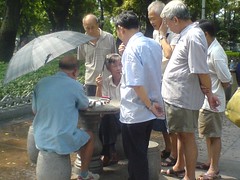
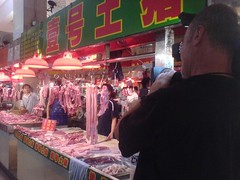
The rest of the day was spent filming around
Compared to








